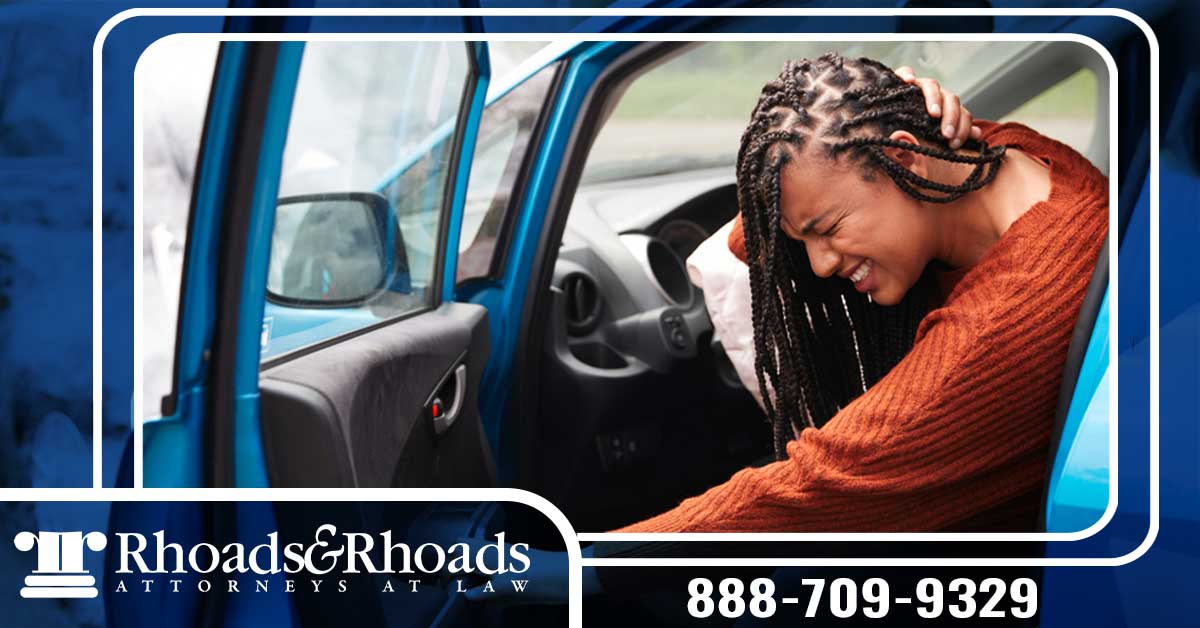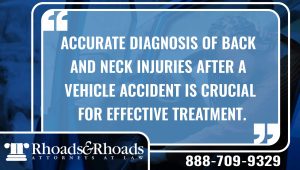
Experiencing a car accident or auto accident can be both shocking and disorienting. In the aftermath, it’s crucial to take immediate steps to ensure your safety and address potential injuries, especially those affecting the back and neck.
These types of car accident injuries, including spinal cord injury, neck injuries, and back or neck injury, can be some of the most dangerous when not handled correctly, so it’s essential to understand them.
Below is a guide on what to do right after a car accident and how to manage neck pain and back pain resulting from the incident.
Immediate Steps After a Car Accident
Taking the right steps immediately following a car accident can be crucial when it comes to preventing long-term damage to the human body.
Here’s what you should do:
-
 Seek medical attention: The first and most important step is to seek medical care, even if you don’t feel immediate pain. Back and neck injuries can have delayed symptoms. A medical provider can identify issues early and recommend necessary treatments.
Seek medical attention: The first and most important step is to seek medical care, even if you don’t feel immediate pain. Back and neck injuries can have delayed symptoms. A medical provider can identify issues early and recommend necessary treatments. - Call emergency services: Always call emergency services to report the accident. This is vital for documenting the incident and getting immediate medical help for anyone injured.
- Document the scene: If you’re able, document the scene of the accident. Take photographs of the vehicles involved, the surrounding area, and any visible injuries.
- Exchange information: Exchange contact and insurance information with the other driver(s) involved. Get the names, phone numbers, addresses, and insurance details.
- Report the accident: Report the accident to your insurance company as soon as possible. Provide them with all the details you’ve gathered and follow their instructions for filing a claim.
Types of Back and Neck Injuries Commonly Sustained in Car Accidents
Car accidents can cause a variety of back and neck injuries. Understanding these injuries can help you recognize symptoms and seek appropriate medical treatment.
- Whiplash: This is a highly common type of neck injury from car accidents, especially in a rear-end collision. It is called whiplash because it occurs when the head is suddenly jerked forward and backward, causing neck strain on the muscles and ligaments of the cervical spine. A whiplash injury can be extremely uncomfortable and may lead to chronic discomfort if left untreated.
- Herniated discs: A herniated disc, also known as a slipped disc or ruptured disc, occurs when the soft cushion (spinal discs) between the bones in your spine pushes out. These shock absorbers can be damaged, causing severe pain and even nerve damage. Disc herniation can occur in any part of the spine but is common in the cervical spine and lumbar region.
- Spinal cord injuries: Spinal cord injuries are serious and can occur during a high-impact auto accident. These injuries can affect the stability of the spine and may lead to partial or complete paralysis. They can occur in any part of the spine, including the cervical spine, thoracic spine, or lumbar region.
- Soft tissue injuries: Soft tissue injuries, including muscle strains and ligament sprains, are common in car accidents. These injuries can cause significant discomfort and may require extensive physical therapy for recovery.
- Facet joint injuries: Facet joints are small joints located between and behind each vertebra in the spine. Facet joints can be damaged in accidents, causing pain and limiting mobility. Facet joint injuries can lead to discogenic pain, which is pain originating from the spinal discs.
- Spinal stenosis: This spinal cord condition involves the narrowing of the spinal canal, which can be caused or exacerbated by an auto accident, leading to pressure on the spinal cord and nerves. Spinal stenosis can be serious and lead to paralysis.
- Neck Sprain: A neck sprain is an injury to the ligaments that connect the bones of the neck causing neck pain and limited mobility in the neck area.
Recognizing Symptoms of Back and Neck Pain After a Car Accident
 Back and neck pain can manifest immediately after a car accident or develop over time.
Back and neck pain can manifest immediately after a car accident or develop over time.
Many symptoms may appear, including:
- Severe neck pain or back pain
- Numbness and tingling in the arms or legs
- Headaches, often indicating disc injuries
- Muscle spasms
- Head inability to turn or move normally
- Pain that worsens as the body ages
- Stiffness in the neck or back
- Reduced range of motion
It’s important to note that some symptoms may be delayed, appearing days or even weeks after the accident. Always consult a medical professional if you experience any of these symptoms following a car crash.
Diagnosing Neck and Back Injuries
Accurate diagnosis of back and neck injuries after a vehicle accident is crucial for effective treatment. Medical professionals use various methods to diagnose these injuries and create a treatment plan for accident victims.
Common Diagnostic Tools
- X-rays: Used to detect fractures and dislocations in the spinal column
- MRI (Magnetic Resonance Imaging): Provides detailed images of soft tissues, including muscles, ligaments, and herniated discs
- CT Scans (Computed Tomography): Offers detailed images of bones and can identify fractures not visible on X-rays
Treatment for Car Accident-Related Neck and Back Pain
Treating back and neck pain after a car accident involves a combination of medical treatments and self-care measures.
Non-surgical Treatments
- Physical therapy: Physical therapy is crucial for treating injuries such as pinched nerves, upper back pain, lumbar spine injuries, neck sprains, and arm pain. It involves exercises and techniques designed to improve lumbar spine mobility, strengthen muscles, and reduce pain.
- Chiropractic care: Chiropractic care can help realign the spine and relieve pressure on nerves. This treatment can be particularly effective for conditions like herniated discs and joint injuries.
- Pain management strategies: These may include anti-inflammatory medications, muscle relaxants, and pain relievers. In some cases, doctors may recommend epidural steroid injections to reduce inflammation and provide pain relief.
- Soft tissue therapies: Massage and other soft tissue therapies can help alleviate muscle tension and promote healing.
Surgical Options
In severe cases, surgical intervention may be necessary to treat neck and back injuries. Surgical procedures are usually considered when non-surgical treatments fail to provide relief.
Types of Surgeries
- Discectomy: Removal of a herniated disc to relieve nerve pressure
- Spinal fusion: Joining two or more vertebrae to stabilize the spine
- Laminectomy: Removal of a portion of the vertebral bone to relieve pressure on the spinal cord or nerves
Home Remedies and Self-Care:
In addition to professional medical treatments, there are several self-care measures you can take to manage intense back pain at home:
- Ice and heat therapy: Applying ice packs can reduce inflammation and numb sore tissues. Heat therapy helps relax muscles, lessen muscle spasms, and improve blood flow to the affected area.
- Gentle stretching exercises: Performing gentle stretches can help maintain flexibility and reduce stiffness. Avoid any movements that cause pain.
- Over-the-counter pain relief: Pain relievers such as ibuprofen or acetaminophen can help manage pain and reduce inflammation.
Understanding Your Legal Rights for Pain After a Car Accident
If you’ve suffered neck and back injuries from a car accident, understanding your legal rights is crucial. You may be entitled to pursue compensation for your injuries, pain and suffering, and other losses.
Filing an insurance claim is a necessary step after a car accident. Ensure you provide detailed documentation of the accident and your injury to support your claim. Be prepared to work with an insurance adjuster, but consider consulting a car accident lawyer to help navigate the complexities of personal injury claims.
Factors Influencing Settlement Amounts:
- Severity of the injury
- Impact on quality of life
- Medical expenses and lost wages
- Long-term or permanent disabilities
Preventing Neck and Back Pain After a Car Accident
While it’s impossible to prevent all accidents, taking certain precautions can reduce the risk of injury in a car accident:
- Always wear your seat belt
- Maintain a safe distance from other vehicles
- Avoid distractions while driving
- Ensure proper car seat adjustments for better support of your neck and back
Long-Term Management of Chronic Pain
For some, neck pain and back pain may become a chronic condition.
Managing chronic pain after a car accident requires a comprehensive approach:
- Adopt a healthy lifestyle with regular exercise and a balanced diet
- Practice stress management techniques
- Attend regular check-ups with your healthcare provider
- Consider long-term therapy or pain management treatments
Frequently Asked Questions About Car Accident Back and Neck Injuries
- How long does neck pain and back pain after a car accident last?
The duration varies depending on the severity of the injury and the effectiveness of the treatment. Some may recover in a few weeks, while others may experience chronic discomfort.
- Can I prevent neck and back injuries in future accidents?
While it’s not possible to prevent all injuries, wearing a seat belt, practicing safe driving, and ensuring proper car seat adjustments can reduce the risk of severe injuries.
- What should I do if my symptoms worsen over time?
Seek medical attention immediately. It’s important to address any changes in your condition promptly to prevent further damage.
- Can a car accident cause injuries to the thoracic spine?
Yes, car accidents can cause injuries to the thoracic spine, which is the middle section of your back. These injuries can range from mild sprains to more severe fractures or disc herniations.
- What are injuries to the facet joint and how do they occur in auto accidents?
Injuries to the facet joint involve damage to the small joints between vertebrae that allow for spine flexibility. In auto accidents, sudden impact or whiplash can cause the facet joints to become inflamed or damaged, leading to pain and reduced mobility.
6. How do I choose the right doctor or specialist for my injuries?
Choose a doctor who specializes in treating neck injuries and back injuries. Personal recommendations, online reviews, and professional credentials can help you find a suitable specialist.
7. What compensation can I expect for my neck and back injuries?
Compensation varies based on the severity of your injuries, the impact on your life, medical bills, and other factors. Consulting with a car accident lawyer can provide a clearer understanding of your potential settlement.
Skilled Representation for Your Neck Pain After a Car Accident
 Recovering from neck injuries and back injuries after a car accident requires timely medical intervention, appropriate treatments, and a proactive approach to long-term care. By understanding your injuries and seeking the right help, you can improve your chances of a full recovery. Remember, every injury is unique, and it’s essential to work closely with medical professionals to develop a personalized treatment plan that addresses your specific needs.
Recovering from neck injuries and back injuries after a car accident requires timely medical intervention, appropriate treatments, and a proactive approach to long-term care. By understanding your injuries and seeking the right help, you can improve your chances of a full recovery. Remember, every injury is unique, and it’s essential to work closely with medical professionals to develop a personalized treatment plan that addresses your specific needs.
If you’re struggling with neck pain or back pain after a car accident, don’t hesitate to seek medical care and legal advice. With the right support and treatment, you can work towards recovery and regain your quality of life, even if you’re dealing with chronic neck pain or severe back and neck injuries like spinal cord injury or disc herniation.
If you’ve suffered a neck injury due to someone else’s negligence, you don’t have to face the challenges alone. At Rhoads & Rhoads, our compassionate and experienced attorneys are dedicated to providing skilled representation and personalized attention to every client. Leveraging 50 years of legal experience in Western Kentucky, we provide knowledgeable counsel. We understand the physical, emotional, and financial toll a neck injury can take, and we’re committed to fighting for the compensation you deserve.
Our team will guide you through the legal process with empathy and transparency, allowing you to focus on your recovery. Don’t let the complexities of a neck injury case overwhelm you – reach out to Rhoads & Rhoads today for a free consultation. Let us put our knowledge and experience to work for you, advocating for your rights and working tirelessly to achieve a favorable outcome for your case.
Schedule a free case evaluation with one of our lawyers today by calling us at 888-709-9329.


